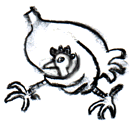Cyborgs Can Have Robotic Protatectomies
Robotic vs. Open Prostate Surgery
The Henry Ford Hospital has an interesting video clip describing the daVinci Robotic Surgical system (wmv, 16.8MB). Despite the rather disturbing sappy-feel-good soundtrack, and Dr. Mani Menon's comparison of the removal of the cancerous prostate to scuba diving or The Fantastic Voyage, the combination of computer-enhanced visualization and robotic surgery looks pretty amazing.
The Henry Ford Hospital has an interesting video clip describing the daVinci Robotic Surgical system (wmv, 16.8MB). Despite the rather disturbing sappy-feel-good soundtrack, and Dr. Mani Menon's comparison of the removal of the cancerous prostate to scuba diving or The Fantastic Voyage, the combination of computer-enhanced visualization and robotic surgery looks pretty amazing.



